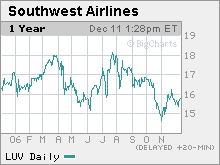 It has been quite a year for airline stocks. American Airlines shares are up 26 percent; US Airways, 33 percent; and Continental Airlines, 70 percent. The exception, ironically, has been the carrier that makes the most money: Southwest Airlines. Despite a 25 percent increase in earnings, Southwest stock was down 3 percent as of early December. The cut-rate carrier now has a 2007 P/E ratio of 16, its lowest in years. Bottom line: It is an ideal time to buy one of the best-run companies and best-performing stocks of the past 30 years.
It has been quite a year for airline stocks. American Airlines shares are up 26 percent; US Airways, 33 percent; and Continental Airlines, 70 percent. The exception, ironically, has been the carrier that makes the most money: Southwest Airlines. Despite a 25 percent increase in earnings, Southwest stock was down 3 percent as of early December. The cut-rate carrier now has a 2007 P/E ratio of 16, its lowest in years. Bottom line: It is an ideal time to buy one of the best-run companies and best-performing stocks of the past 30 years.Explanations for why Southwest has fallen out of favor just don't hold up under scrutiny, according to Citigroup analyst Andrew Light. One concern is that the airport hassles and heightened security measures that dented third-quarter earnings - a byproduct of the British airline terror plot - will extend into 2007. The reality is that things are pretty much back to normal, as evidenced by the 12 percent rise in Southwest's revenue passenger miles (a key airline metric) in both October and November.
Another worry is that Southwest's cost advantage is narrowing. In fact, Southwest's cost advantage over traditional carriers is still substantial. Thanks to superior hedging, Southwest will pay $1.54 a gallon for jet fuel in 2007, vs. $1.91 for American and JetBlue, Light estimates. Southwest's nonfuel costs are on average 30 percent lower than those of its major rivals.
Perhaps the biggest concern of all is that Southwest is now too big to keep growing at a high rate, an assertion that CEO Gary Kelly fiercely rejects. "Our growth opportunities are as strong in the near term as they've been in years," he says, pointing to new revenue sources such as cargo; new markets like Denver, Philadelphia and Fort Myers, Fla.; and the potential to capture routes, gates and passengers from competitors going through mergers or bankruptcies.
What's the endgame for Southwest? Morgan Stanley airline analyst William Greene envisions a future in which Southwest is able to increase its market share in the U.S. to a stunning 50 percent, from 17 percent today. "Southwest's low fares and leading cost structure would likely foster an environment where it would be difficult for carriers to justify significant capacity additions if their costs were substantially higher than Southwest's," Greene wrote in a recent report. "If we're right about the future of the U.S. airline industry, Southwest's profits and share price are likely going much, much higher." Nothing wrong with up, up and away.
